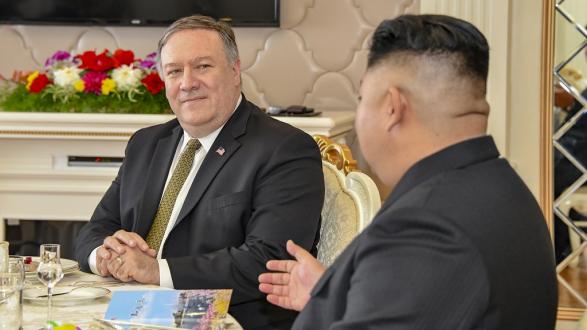Kim Jong-un’s New Year’s address is a signal that North Korea’s transition to a “normal country” is on track despite a lack of rapid progress in denuclearization. The international community needs to keep engaging Pyongyang in order to encourage positive reform.
It is important to keep in mind that dramatic changes in North Korea’s relations with the outside world that took place in 2018 all started with Kim’s New Year’s address a year ago. In the face of stalled progress in U.S.-North Korea relations since the historic Singapore Summit in June, analysts have looked to this New Year’s speech to provide insight into Kim’s intentions and his country’s future trajectory.
The overall image of North Korea that emerges from the speech is a country focused on economic development and modernization. Kim spent the bulk of this speech highlighting achievements and areas for improvement in the economy and society. In the beginning of the speech, Kim made clear the country has been on an all-out campaign for economic development since making the shift in April away from the previous byungjin policy of simultaneous progress in economic and military spheres. When Kim did briefly touch on the importance of military strength, he took care to add that the defense industry’s goal was to support the economy.
When Kim did discuss relations with the outside world towards the end of the speech, his overall message was continuing the momentum built in 2018 for peace and reconciliation, especially with South Korea, but also with the United States.
While Kim couched economic development in the language of juche or self-reliance, the official ideology of North Korea, the speech betrayed hints of reform-minded changes afoot. For example, he used the term “companies” to describe certain North Korean economic entities and argued for educational reforms in line with global trends. Kim also emphasized the importance of improving his people’s quality of life when he, for example, highlighted certain new consumer goods popular with the North Korean masses.
When Kim did discuss relations with the outside world towards the end of the speech, his overall message was continuing the momentum built in 2018 for peace and reconciliation, especially with South Korea, but also with the United States. Although Kim did not spell out specifics of denuclearization, he reaffirmed a commitment to denuclearization and stated his country will not engage in nuclear testing or weapons development. And while he did warn the United States against intransigence in negotiations, he said nothing hostile against Washington and extended an open invitation to a second summit with President Trump.
Indeed, concerning relations with the outside world, Kim emphasized more than once that the historic changes made in 2018 were only a first step in a long journey. Kim counseled patience in building the mutual trust necessary for progress in U.S.-North Korean relations, and the United States would do well to remember that it can take time to build mutual trust with a country such as North Korea that has been a bitter adversary for decades. Washington would also do well to think outside the box when it comes to negotiating with Pyongyang and try imaginative new approaches to break the current stalemate in bilateral relations.
It is now incumbent on the international community, including the United States, to engage this young leader and encourage him to pursue reforms that will benefit his people and ultimately build a more peaceful world.
In giving his speech, Kim Jong-un looked the part of a serious businessman ready to deal with his counterparts in other countries. Dressed in a western business suit and sitting on a comfortable couch in a well-apportioned office, Kim looked more like a corporate CEO than a communist revolutionary. It is now incumbent on the international community, including the United States, to engage this young leader and encourage him to pursue reforms that will benefit his people and ultimately build a more peaceful world.
_______________________
Jongsoo Lee is a Pacific Council member, a senior managing director at Brock Securities, and center associate at Harvard University’s Davis Center for Russian and Eurasian Studies.
This article was originally published by the Financial Times.
The views and opinions expressed here are those of the author and do not necessarily reflect the official policy or position of the Pacific Council.




